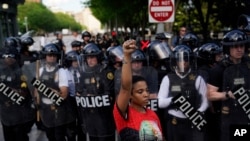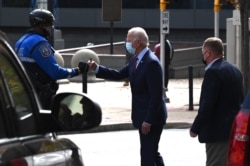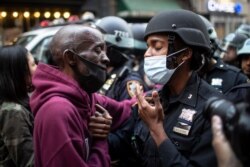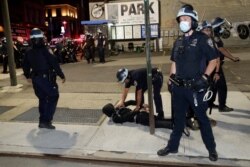U.S. President Joe Biden, in his first weeks in office, is facing growing calls from civil rights groups to turn campaign pledges for police and criminal justice reform into action.
“We want Biden to deliver on the racial justice agenda,” Melanie Campbell, president and CEO of the National Coalition on Black Civic Participation, told VOA.
Groups representing law enforcement, meanwhile, say they want a seat at the table and urge consultation before any sweeping mandates are issued from Washington.
As a six-term U.S. senator, Biden had strong backing from police organizations. Now, as president, he is expected to sign an executive order that sets up a national commission on the use of excessive force by law enforcement officers. More broadly, Biden has pledged to confront and address racial inequality in America.
“I believe President Biden will take steps in the first 100 days of his administration to address criminal justice reform,” said Marc Morial, president and CEO of the National Urban League.
Morial was among a group of civil rights leaders who met with Biden in December to discuss policy priorities, including a bill to make police more accountable to the communities they serve, set uniform policing standards and create a national database of officer misconduct.
“We expect the administration to push for passage of the Justice and Policing Act in Congress,” Morial told VOA. He said the only way to change policing is with “a strong federal law.”
Flashpoint for protests
Demands for federal action accelerated during months of nationwide racial justice demonstrations last year. The protests erupted after the death in May of African American George Floyd in police custody in Minneapolis, Minnesota. Derek Chauvin, a white police officer, was charged with second-degree unintentional murder after he knelt on Floyd’s neck for more than 8 minutes - an incident captured on video. President Biden described Floyd’s death as a “turning point” in the nation’s reckoning with systemic racism.
Today, social justice groups want the administration to push U.S. lawmakers to reintroduce the George Floyd Justice in Policing Act of 2020, which stalled last year in what was then a politically divided Congress. The legislation seeks to make police officers nationwide accountable for misconduct and abuses such as excessive use of force and to combat racial profiling in law enforcement, among other goals.
During last year’s campaign, Biden proposed allocating $300 million to promote community policing programs. Funding would be distributed to hire and train officers for jurisdictions that commit to creating police forces mirroring the racial diversity of their communities.
Police organizations weighing in
Law enforcement organizations are signaling wariness of federal initiatives under Biden.
“I think some law enforcement leaders feel a sense of abandonment after hearing some of Mr. Biden's policy proposals before he was elected [president],” Bill Johnson, executive director of the National Association of Police Organizations, told VOA.
In a statement, the group, which represents more than 241,000 law enforcement officers, called for a dialogue with the White House “to ensure rank-and-file officers have a voice and are represented on a commission that would examine policing and recommend changes for the betterment of the system.”
Biden’s ties to law enforcement run deep. He was a key architect of a landmark 1994 federal anti-crime bill that, among many provisions, promoted the hiring of 100,000 additional police officers across America and expanding the U.S. prison system. Signed into law by then-President Bill Clinton, the legislation has been fiercely criticized by civil rights groups as an accelerant for mass incarcerations disproportionately impacting people of color, especially African Americans.
Calls for change
As a candidate last year, Biden promised to bring police officers, police unions and civil rights groups together for conversations at the White House. Social justice activists say they are waiting for the call.
“It’s disappointing Black Lives Matter has not heard anything about our request for a meeting with the president and vice president. We would like to talk about our priorities,” said Black Lives Matter co-founder Patrisse Cullors in a statement. The group has been at the forefront of demands to end police brutality against African Americans and organized a series of racial justice demonstrations last year.
Other civil rights activists worry the Biden administration will give less attention to criminal justice reform at a time when much attention is focused on reviving the U.S. economy and combatting the coronavirus, which causes the COVID-19 disease.
“I understand we are dealing with COVID-19 and hard economic times but that doesn’t mean we have to stop fighting for George Floyd and other African Americans killed by police unjustly,” said Campbell of the National Coalition on Black Civic Participation.
African American voters rallied behind Biden in key primary states last year and helped propel him to victory in the general election in states like Georgia. Civil rights leaders say continued engagement will be critical going forward.
“I do not think you can sit back and say, ‘Well Joe Biden, you've been elected; now go make it happen,’” said Morial of the National Urban League. “It's not going to be done without continued advocacy. I think we have to keep the pressure on the administration and on members of Congress to support these sorts of criminal justice reforms.”







